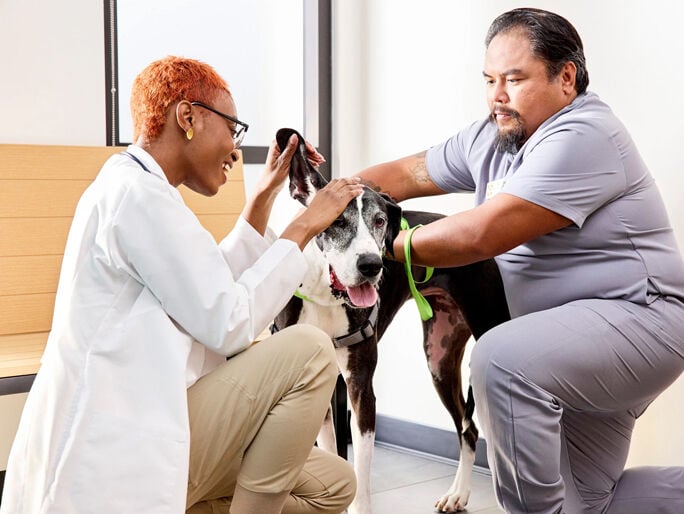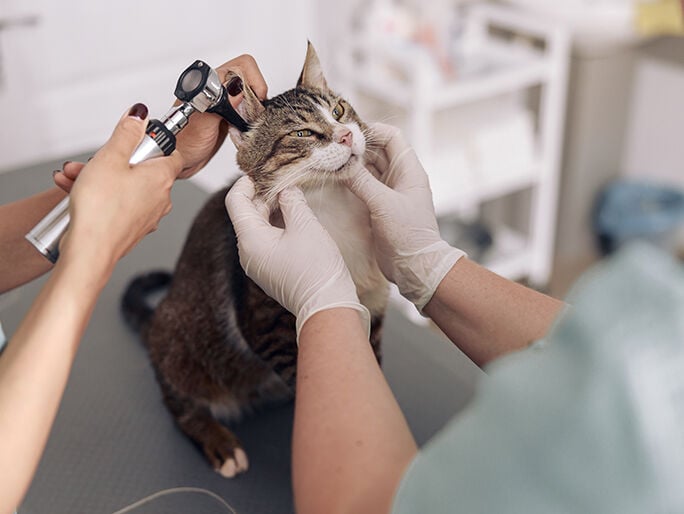Banfield’s pet food allergies guide
You may be surprised by what food allergy symptoms in pets look like — and what they don't.
Food allergies often affect ears and skin — not just tummies! This can lead to inflamed, itchy skin and recurring ear issues.

Common symptoms of pet food allergies
- Itchy skin or ears
- Reddened skin
- Recurring ear discomfort
- Vomiting
- Diarrhea
Does your pet have a food allergy?
A pet that is constantly scratching or has recurring ear infections could have an allergy to ingredients in their food.

What’s an allergy?
Simply put, an allergy is an immune response.
While the immune system defeats germs and heals wounds, it also attacks allergens (e.g., dust mites or pollen) when the body identifies them as a threat. Likewise, food allergies also start in the immune system.
If your pet has a food allergy, their body reacts to that food like it would to an infection. Their allergy symptoms, like runny eyes and itchy skin , are a result of antibodies attacking the allergens to help fight off the “threat.”
Food sensitivities and ingredient intolerances may cause dietary distress when your pet can’t digest a particular food.
Common food allergy symptoms in pets
Partner with your veterinary team if you think your pet has an allergy or intolerance to their food.
Diagnosing a pet food allergy can be tricky because food allergies, environmental allergies, and other pet ailments can present similar symptoms. As a result, simply switching your pet’s diet isn’t always the most effective way to help.

Vomiting and diarrhea
Stomach upset can be caused by parasites, bacterial infections, food intolerances, and stress.

Itching and scratching
Many things cause itchy pets, including seasonal allergies, food allergies, dry air, fleas, yeast, skin infections, and more.

Red and irritated skin
Inflamed skin can be a sign of infection, a skin condition, parasites, or other allergies.

Ear infections
Ear infections are often tied to inflammation caused by allergies, but they can also be caused by mites, yeast, ear injuries, and bacteria.
What pet food ingredients can cause allergies?
While you may have heard that some ingredients — like corn or grains — cause allergies in pets, the evidence isn't conclusive.
In fact, meat protein allergies are more common than grain allergies in pets.
Many ingredients labeled as “bad” actually supply essential nutrients for your pet’s diet and shouldn’t be avoided.
There is no single “bad” ingredient that causes food allergies.
Pets can develop a food allergy to any food item. Some pets are genetically predisposed to food allergies, while others develop a sensitivity to certain ingredients over time.
Meat proteins are a common allergen.
Different proteins — most often from beef, chicken, dairy products, eggs, and soy — are the more common food allergy triggers in pets. Wheat gluten and properly processed corn are usually both well tolerated and a great mechanism for vital nutrients.
Preservatives in pet food seldom cause pet food allergies.
Preservatives aren’t a common allergy trigger in pets, and artificial colors and flavors aren’t usually used in pet food.
Don’t share your food.
People food is a bad idea for pets. Just because something sits OK with you doesn’t mean your furry friend can tolerate it. In fact, human cuisine often contributes to allergies in pets.
Treating pet food allergies
There is no cure for food allergies, which are chronic conditions that often need lifelong management for your pet. While seasonal or environmental allergies can sometimes be helped by medication, food allergies usually require a strict, allergen-free diet.
If your pet does have a food allergy, lifestyle changes — like switching to a special allergen-free diet — can often help. These special diets come in many varieties.

Hypoallergenic diets
These prescription foods are specially formulated to give your pet the nutrition they need without triggering their immune system. They are manufactured according to strict rules to help avoid cross-contamination with allergen-containing ingredients.
Novel protein diets
These foods can also be prescribed by your vet. They typically contain special or “novel” proteins, like kangaroo, that may not trigger the same allergic response in your pet.
Limited-ingredient diets
Depending on your pet’s needs, your vet may also recommend feeding them a high-quality commercial “limited-ingredient” food. These foods are formulated without your pet’s trigger allergen. However, unlike therapeutic foods, commercial foods often don’t guarantee that they’re made in a hypoallergenic environment.
Homemade diets
Talk to your vet so they can help advise you on ways to make sure you’re feeding your pet the right balance of (non-allergenic) protein, carbs, and other vital nutraceuticals to help their body get the right nourishment.
Mentioned in this article


Why is my dog scratching their ear?
Sometimes a scratch is more than a little tickle.

Does your cat have an ear infection?
Know the symptoms of ear issues in cats.

Worried about your pet? Ping Pet Chat™!
Whether it's 3 a.m. or 3 p.m., connect with a real veterinary professional for immediate petcare advice. It's included in all Optimum Wellness Plans®!
Log in to start chattingHow Banfield can help with dog and cat diet and nutrition
What your pet eats can make a big difference to their health! Our vets can perform physical exams, run tests, and help you manage your pet’s food-related issues, including obesity, diabetes, and food allergies.

Get help managing pet food allergies. Do you think your pet’s immune system is reacting to certain ingredients in their food? We can help identify pet food allergies and work with you on management diets.
Does your pet have diabetes? Let’s work together! This includes everything from recommendations on what to feed your pet, how to manage their food and injection schedule, providing appropriate prescriptions, and showing you how to safely perform insulin injections for the pet you love.
We can help your pet reach a healthy weight. We've got advice on diet and exercise for both overweight and underweight pets. Does your pet have a mobility issue that makes it hard for them to exercise? We can help there, too.
 Mites and mange
Mites and mange Podcast - Not Just Fluff
Podcast - Not Just Fluff



